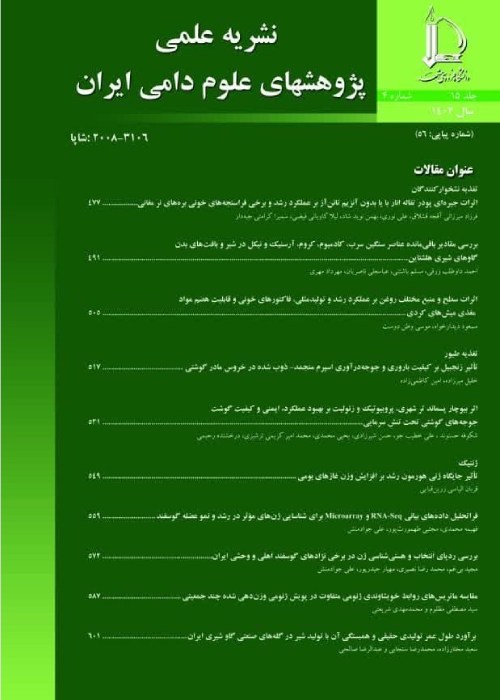Dietary organic and inorganic zinc supplements in Kermani male lambs: Impacts on serum minerals, antioxidant status and some blood parameters
Sheep production in arid and semi-arid parts of Iran undergoes feed shortage due to poor natural vegetation. Trace minerals, as metabolic modifiers, are essential in ruminants’ diets because of their contribution in biochemical processes required for normal growth and development. Zinc (Zn) is one of the most deficient minerals in soils of many parts of the world including Iran. Zinc is known to affect growth, reproduction and immune system of the animals. Although administration of Zn supplements in ruminants’ diets has been receiving increased attention in recent years, however, it is not well-established that how much of Zn supplement is more effective for improving fattening lambs’ performance, metabolism and antioxidant status. Furthermore, there are a few information about blood minerals of Kermani sheep. Thus, the aim of this study was to evaluate the likely effects of different Zn sources on some blood parameters related to animal health and production.
This study was conducted at the Research Station of Department of Animal Sciences, University of Jiroft, Iran. Twenty-one Kermani male lambs (7 months of age, 28 ± 0.9 kg of body weight) were assigned to 1 of 3 following treatments (7 lambs each) for 9 weeks in a completely randomized design: (1) Control diet; (2) Control diet plus supplemental zinc-methionine (Zn-Met, 40 mg/kg dry matter (DM)) and (3) Control diet plus supplemental zinc sulfate (ZnSO4, 40 mg/kg DM). Two weeks adaptation period to basal diet was done before the experimental period. Basal diet contained 48 and 11.7 mg/kg DM of Zn and Cu respectively. Blood samples were collected before commencement (time 0), and at weeks 3, 6 and 9 of the experiment. Serum minerals and metabolites concentrations and whole blood superoxide dismutase activity (SOD) were measured. Maximum air temperature and minimum relative humidity data were used to calculate the temperature-humidity index (THI). Statistical analysis was carried out using SAS software. A mixed model with fixed effects of treatment, week and treatment × week, as well as the random effect of lamb within treatment × week were used. Time of sampling (week) was used as a repeated effect and subject for the repeated statement was lamb within dietary treatment. Where biologically worthwhile and significant, the initial values for blood metabolites (before supplementation (time 0)) and initial body weight were included in model as a covariate to further improve the analysis precision. The significant differences were declared and tendencies .
Based on the findings, Kermani male lambs of this study had deficient blood Zn contents (under 90 µg dl-1) before the commencement of the experiment. Lambs on Zn-Met- and ZnSO4- supplemented diets had higher serum average Zn concentrations than those on the control diet (P<0.05). Serum Zn content showed a time-dependent trend so that Zn-supplemented groups had higher Zn concentrations at week 3 in spite of weeks 6 and 9 of the experiment (P<0.05). The concentrations of serum calcium, phosphorous and copper were not affected by the treatments. However, calcium and phosphorous increased by time (P=0.02). Dietary Zn supplementation of lambs, irrespective of its source, led to increased average blood alkaline phosphatase activity (ALP) which was more obvious in week 3 of the experiment (P<0.05). This similar trend between Zn and ALP contents through time may imply to the close association between blood Zn concentration with ALP activity. Lambs on Zn-Met-supplemented diet exhibited improved SOD activity comparing those on the control diet (P<0.05). These findings, suggesting that at least the supplemented Zn is being incorporated in the system, resulting in increased SOD activity. Serum glucose and total protein concentrations increased during time (P<0.01) but no differences were observed among experimental groups.
These results indicated the beneficial effects of dietary Zn supplementation of 40 mg/kg diet for increasing serum Zn concentration and alkaline phosphatase activity of male lambs. Zn-Met was more effective than ZnSO4 for improving antioxidant status. In addition, no adverse effects of Zn supplementation on serum copper, calcium, phosphorous, glucose and total protein concentrations were observed. Additionally, some blood parameters such as Zn concentration and ALP activity revealed a time-dependent variation in this study which suggests that repeated blood sampling may be more appropriate than endpoint sampling particularly in respect to blood metabolites.
- حق عضویت دریافتی صرف حمایت از نشریات عضو و نگهداری، تکمیل و توسعه مگیران میشود.
- پرداخت حق اشتراک و دانلود مقالات اجازه بازنشر آن در سایر رسانههای چاپی و دیجیتال را به کاربر نمیدهد.


